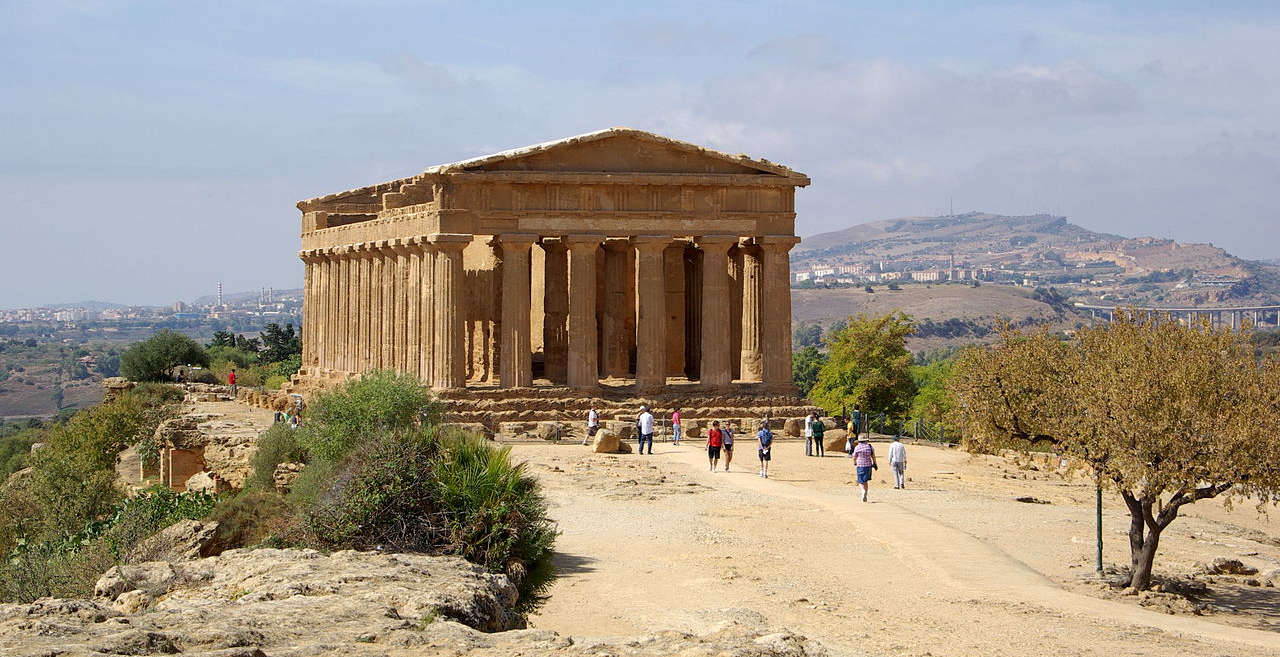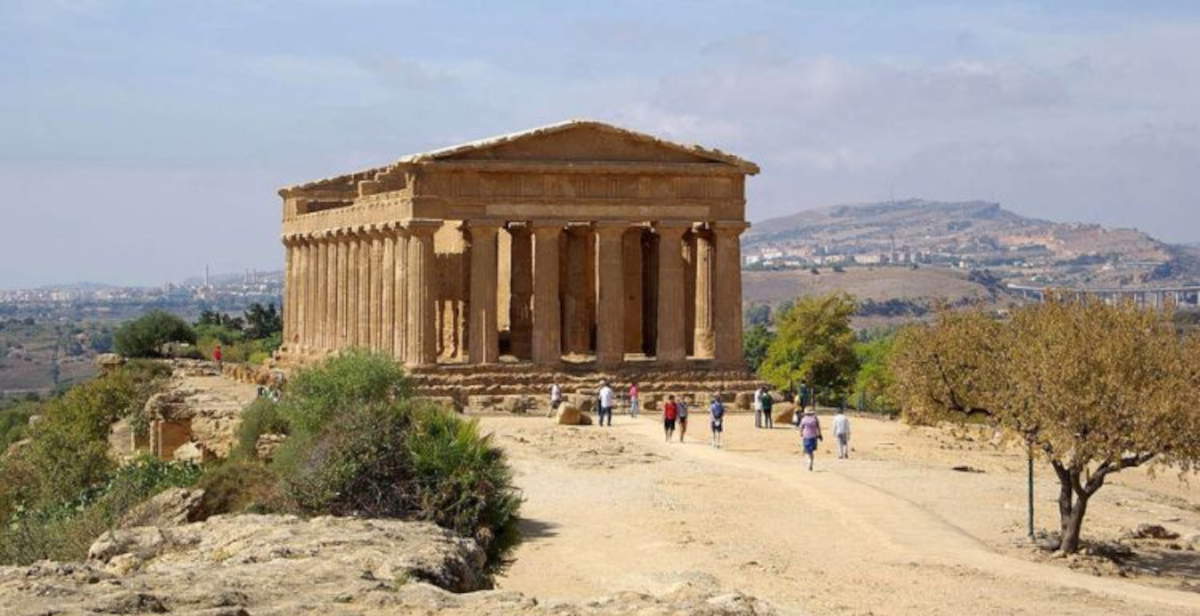650,000 euros for Riccardo Muti’s concert in Agrigento, six times that the bill for the same concert organized last year in Lampedusa and also sponsored by the Sicilian Region. It is another tile that falls on Agrigento Italian Capital of Culture 2025: it was supposed to be an event destined to mark the cultural rebirth of Agrigento, but the capital year has taken on tones far different from expectations. We had covered it back in March with an article by Leonardo Bison, who called the event a “disaster.” And the spotlight, initially focused on celebrating the beauty of the Valley of the Temples and the city’s historical legacy, nevertheless continues to shift to a long trail of controversies involving the disbursement of public money, organizational choices, and a management accused of inefficiency. The first warning came with the controversial Christmas 2024 event, organized and recorded in the middle of August in Agrigento’s Archaeological Park, which closed for two days(article here and Federico Giannini’s opinion here instead). The concert by the trio “Il Volo,” broadcast by Channel 5 during the winter holidays, called for off-season Christmas staging, with spectators invited to wear coats and columbos despite the summer heat. The scenic intervention also involved the Temple of Concord, decorated with Christmas elements such as balls and streamers. The operation, financed by the Sicilian Region, cost about 1.2 million euros.
Upon the city’s official proclamation as Italian Capital of Culture 2025, however, critical issues multiplied. The water crisis negatively affected tourist and hotel accommodation, creating inconvenience for residents and visitors. At the same time, there has been no shortage of reports of egregious errors in information materials and road signs: from the words “Valley of Temples” to “Casa Pirandello contrata Caos,” a series of inaccuracies that have attracted media attention and fueled discontent.
And now, as if that were not enough, there is a return to the controversy over the allocation of the total appropriation of 1,714,360 euros earmarked for the Valley of the Temples Archaeological and Landscape Park for initiatives related to the Capital of Culture year. The problem, in this case, was denounced by Italia Viva Sicilia, with an attack by Caterina Greco, head of the culture sector for Sicily within Matteo Renzi’s party: in fact, it was Greco who raised the issue of maestro Riccardo Muti’s concert with the Luigi Cherubini Youth Orchestra at the Temple of Concordia, held on July 7, 2025, for which as much as 650.000 euros. “The Sicilian Region does not deny itself. It has firmly taken over the reins of Agrigento Capital of Culture and twists the program by organizing a concert conducted by Riccardo Muti with his Cherubini youth orchestra.” According to reports in the newspaper Report Sicilia, this is an exorbitant cost compared to the same concert that, last year, Muti and the Cherubini orchestra held in Lampedusa, an event also promoted by the Sicilian Region, but cost about 100,000 euros. The same format, in Agrigento, would cost six times as much. What’s more, for the concert the public had to buy tickets costing between 105 and 155 euros.
Always Report Sicilia does all the math in Agrigento Capitale’s pockets: another 60,000 euros went to the Pirandellian Studies conference and educational shows, while the Moviti Fest project, a weekend spread festival that should involve the historic center and municipalities in the province, received 473,360 euros. A concert featuring the Pontifical Sistine Musical Chapel and 600 choristers, on the other hand, received 45,000 euros in funding. For promotion and publicity, 461,000 euros were mentioned, to which 25,000 euros were added for banners.

The figures, particularly the one related to the Muti concert, have therefore triggered a political reaction. The city circle of the Democratic Party expressed doubts about the appropriateness of the expenditure and the lack of transparency. It was Professor Pasquale Seddio, on July 22, who published a post on Facebook containing data provided by the Valley of the Temples Archaeological and Landscape Park.
According to reports, the total takings of the July 7 concert amounted to 41,000 euros, a figure that appears disproportionate to the public investment of more than 650,000 euros. The figure, however, does not clarify precisely the final balance of the event, leaving open many doubts. Lacking, according to the criticisms made by Seddio and also taken up by the local PD, is a monitoring and evaluation plan for the initiatives: “The total lack of a monitoring and evaluation plan has been exposing the Agrigento 2025 Participation Foundation, together with the Valley of the Temples Archaeological and Landscape Park and the Municipality of Agrigento to very high financial (and other) risks for more than a year,” it reads.
The risks, according to the complaint, concern both public funds already allocated but not yet acquired and private funds that, although declared to the Ministry of Culture, have not been sought and therefore do not appear to have been collected. In addition, management that would not respond to the principles of effectiveness and efficiency, transparency, public evidence and economy in the use of public resources is highlighted. In the panorama of Italian and European Capitals of Culture, Agrigento therefore stands out, according to the criticism, for the lack of concrete tools of evaluation and control, a condition that could compromise not only the city’s reputation, but also the actual cultural and touristic spin-off of the title obtained.
To the criticism raised by Professor Pasquale Seddio and the city circle of the Democratic Party on the spending of more than 650,000 euros of public funds for maestro Riccardo Muti’s concert in the Valley of the Temples, Agrigento Mayor Francesco Miccichè responded by stressing the value of the initiative. According to the first citizen, the event represents “is an initiative that testifies once again that the historical, cultural, artistic and landscape heritage of Agrigento is a unique and extraordinary setting for events of international value such as Maestro Muti’s concert.”
The mayor also described the musical event as an opportunity “not to be wasted,” claiming that from the Valley of the Temples will be able to emerge “an intense combination of classical notes and millenary history, fascinating and attracting millions of people.” Faced with accusations of mismanagement of funds, he hoped the event would be supported and not hindered “with prejudice or political ends,” claiming the event’s usefulness in terms of international promotion of the city at a time considered crucial “If Agrigento wins, Sicily wins.” Agrigento now finds itself having to manage a role of national and European visibility, but it does so under a critical lens that points the finger at all the problems highlighted by the newspapers and politicians who point the finger at the management of the event. Report Sicilia, for example, questions what real benefit the events will bring to the city, what return will these huge investments have (Agrigento Capitale’s account to date exceeds 12 million euros), whether the funds have been distributed transparently and with objective criteria.
With only a few months to go before the start of its year as Capital, Agrigento appears caught between symbolic ambition and the limitations of an organizational machine that, according to many observers, has not lived up to expectations. If the title awarded was meant to represent an opportunity for lasting revitalization, it remains to be seen today whether it will succeed in producing concrete and measurable effects or whether it will be remembered as an occasion marked more by controversy than results.
 |
| Agrigento Capital of Culture, 650,000 euros for Riccardo Muti concert: controversy ensues |

The author of this article: Noemi Capoccia
Originaria di Lecce, classe 1995, ha conseguito la laurea presso l'Accademia di Belle Arti di Carrara nel 2021. Le sue passioni sono l'arte antica e l'archeologia. Dal 2024 lavora in Finestre sull'Arte.Warning: the translation into English of the original Italian article was created using automatic tools. We undertake to review all articles, but we do not guarantee the total absence of inaccuracies in the translation due to the program. You can find the original by clicking on the ITA button. If you find any mistake,please contact us.